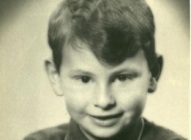Kindertransport refugee

13 March 2012
On Wednesday 14 March 2012 at 4pm at Aberystwyth University (Hugh Owen Building A14) William Dieneman will recall his life story in a talk entitled ‘From Berlin to Aberystwyth: the life history of a former Kindertransportee’.
William was born in Cottbus in 1929 into a Jewish family and lived in Berlin as a boy where he experience the National Socialist take-over. Together with his sister Ursula he was sent to Britain in 1939 as a nine year old on a Kindertransport.
Dr Andrea Hammel (European Languages, Aberystwyth University), an expert on the history and culture of German-speaking refugees who came to Britain in the 1930s and 40s, will introduce the talk and give a brief overview of the history of the Kindertransport.
The term Kindertransport is usually used for the 10,000 unaccompanied German, Austrian and Czech minors, mainly from Jewish backgrounds, who found refuge in the UK between December 1938 and September 1939.
William Dieneman will talk about the challenges of adjusting to life in Britain, his placements with a number of foster families, his education, and his training in librarianship which brought him to Aberystwyth in 1970 as librarian of Aberystwyth University Library.
‘We feel really privileged to have someone like William talk to us in person. As a young boy he was an eyewitness to many events we can only read about in books today’, says Dr Hammel, who teaches an undergraduate module on The History and Culture of German-speaking Refugees from Nazism.
Following on from William Dieneman’s talk, there will be a special viewing and reception at 5.30 of an exhibition entitled ‘Double Exposure: Jewish Refugees from Austria in Britain’ in the Cafe Gallery of the Aberystwyth Arts Centre.
This exhibition features refugees from Austria who settled in the UK, among them the violinist Norbert Brainin, the photographer and cameraman Wolf Suschitzky, the dance teacher Stella Mann, and the composer Joseph Horowitz.
The portraits depict each interviewee in a moment of conversation, seen through the viewfinder of a video camera.
The images are complemented by short messages and thoughts expressed in the interview.
These touch on the general themes of tolerance, refugees, history, humanity, and identity.
The photographic exhibition is accompanied by a film, which follows the lives of the men and women depicted in the portraits and explores their double exposure to the cultures of Britain and Austria.
The exhibition (organised by Andrea Hammel and curated by Bea Lewkowicz) can be seen at the Aberystwyth Arts Centre Cafe Gallery until 7 April 2012. The film will be shown at The Box from 12 until 19 March 2012.
Both events are open to all staff, students and the general public.
AU7412



